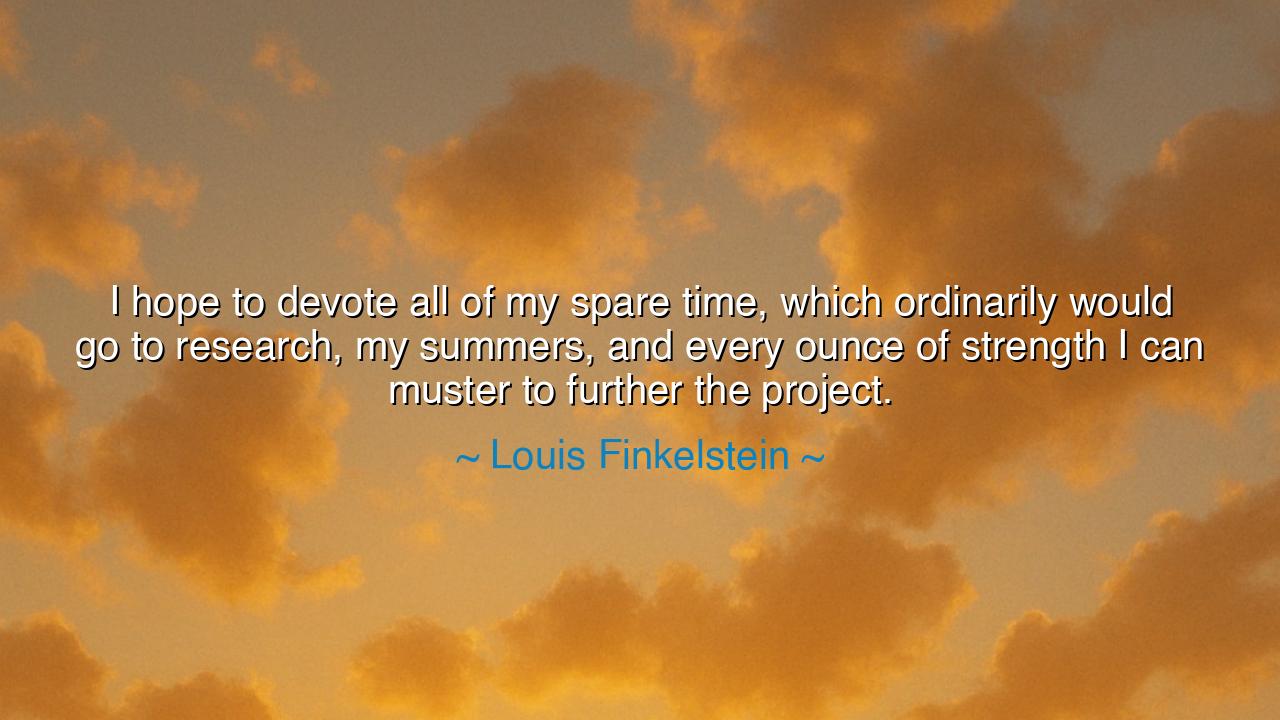
I hope to devote all of my spare time, which ordinarily would go
I hope to devote all of my spare time, which ordinarily would go to research, my summers, and every ounce of strength I can muster to further the project.






"I hope to devote all of my spare time, which ordinarily would go to research, my summers, and every ounce of strength I can muster to further the project." Thus spoke Louis Finkelstein, the scholar and leader, whose life was a testament to discipline and devotion. These words are not idle promises, but a declaration of intent, the confession of one who knows that great works demand great sacrifice. In them we hear the heartbeat of every true pioneer—the one who is willing to give not only his hours of labor, but also his rest, his leisure, and even his strength, until the project of his life stands complete.
The ancients knew that nothing great is born of half-heartedness. The builder of temples, the writer of sacred texts, the leader of nations—all understood that the measure of greatness is the measure of what one is willing to give. Finkelstein’s vow reveals the spirit of such determination: to surrender summers, the season of ease; to surrender spare time, the hours others might call their own; to surrender even the last reserves of strength—all for the sake of a vision greater than comfort. This is the spirit that raises monuments, that advances knowledge, that carries humanity forward.
Consider the story of Thomas Edison, who, in his workshop, labored long into nights, often forgetting food and sleep, driving himself with an unrelenting hunger to perfect his inventions. He sacrificed leisure and rest, pouring every ounce of his energy into the project of bringing light to the world. It was not brilliance alone that made him succeed—it was devotion, the same kind of devotion that Finkelstein expressed. The world we live in today, illuminated by lightbulbs and shaped by countless inventions, is a testament to those who give their lives beyond the call of ordinary hours.
Finkelstein’s words also remind us that the pursuit of knowledge and noble goals is not seasonal. It does not wait for convenient hours or gentle conditions. True devotion is constant. The project, whether it is a book, a mission, a cause, or the shaping of a life, calls upon us to give ourselves wholly. To devote one’s summers—that time of rest—to toil is to declare that the vision is more important than comfort. To devote one’s strength is to declare that even weakness will not be an excuse. Such devotion is heroic, for it places meaning above pleasure, and purpose above ease.
Yet we must also see the humility in these words. Finkelstein does not boast of what he has already achieved—he hopes to devote himself. In this hope is the recognition that discipline is a choice renewed daily. No man becomes great in a single act; he becomes great in the repeated offering of time, energy, and focus. The ancients knew this truth well: the sculptor does not create the statue in one strike, but in thousands of steady blows. So too is the project of life shaped, not in one burst of effort, but in a lifetime of devotion.
The lesson is clear: if you would accomplish something lasting, you must be willing to give what others withhold. Give your spare time, your moments of leisure, your strength even when weary. Do not wait for the perfect season; devote even your summers. For the difference between dreamers and doers lies not in vision, but in sacrifice. The project of your life will not be completed by wishing, but by working.
Practically, this means identifying your own project—the work, mission, or calling that is worthy of your devotion. Once you know it, give yourself wholly. Rise early, work late, sacrifice comfort for progress. Do not measure your labor by hours, but by the depth of your commitment. And when fatigue whispers, remember Finkelstein’s example: that even one’s spare time and waning strength can be offered for a cause that endures beyond a lifetime.
So let this teaching endure: “Devote your time, your summers, your strength to the project of your soul.” For in the end, men are not remembered for the leisure they enjoyed, but for the labor they gave to something greater than themselves. And when your children ask how great works are achieved, tell them: “Not by chance, not by ease, but by devotion—even unto the last ounce of strength.”






AAdministratorAdministrator
Welcome, honored guests. Please leave a comment, we will respond soon